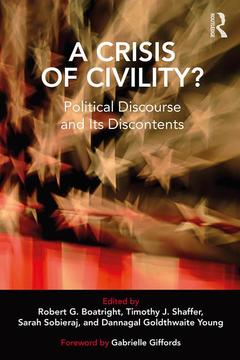A Crisis of Civility? Political Discourse and Its Discontents
Coordonnateurs : Boatright Robert G., Shaffer Timothy J., Sobieraj Sarah, Goldthwaite Young Dannagal

The state of political discourse in the United States today has been a subject of concern for many Americans. Political incivility is not merely a problem for political elites; political conversations between American citizens have also become more difficult and tense. The 2016 presidential elections featured campaign rhetoric designed to inflame the general public. Yet the 2016 election was certainly not the only cause of incivility among citizens. There have been many instances in recent years where reasoned discourse in our universities and other public venues has been threatened.
This book was undertaken as a response to these problems. It presents and develops a more robust discussion of what civility is, why it matters, what factors might contribute to it, and what its consequences are for democratic life. The authors included here pursue three major questions: Is the state of American political discourse today really that bad, compared to prior eras; what lessons about civility can we draw from the 2016 election; and how have changes in technology such as the development of online news and other means of mediated communication changed the nature of our discourse?
This book seeks to develop a coherent, civil conversation between divergent contemporary perspectives in political science, communications, history, sociology, and philosophy. This multidisciplinary approach helps to reflect on challenges to civil discourse, define civility, and identify its consequences for democratic life in a digital age. In this accessible text, an all-star cast of contributors tills the earth in which future discussion on civility will be planted.
Foreword by Gabrielle Giffords. Preface by Carolyn J. Lukensmeyer. Introduction: A Crisis of Civility? [Robert G. Boatright] Part I: How Americans Think about Civility in Politics 1. Two Concepts of Civility [Simon Anthony Laden] 2. How People Perceive Political Incivility [Ashley Muddiman] 3. Perceptions of Incivility in Public Discourse [Kate Kenski, Kevin Coe, and Stephen A. Rains] 4. Signaling Incivility: The Role of Speaker, Substance and Tone [Emily Sydnor] Part II: Instances of Civility and Incivility in Contemporary American Political Discourse 5. "Showdowns," "Duels," and "Nail-biters": How Aggressive Strategic Game Frames in Campaign Coverage Fuel Public Perceptions of Incivility [Dannagal Goldthwaite Young, Lindsay Hoffman, and Danielle Roth] 6. Crises and Civility: Twitter Discourse after School Shootings [Deana A. Rohlinger and Cynthia Williams] 7. Can Civility and Deliberation Disrupt the Deep Roots of Polarization? Attitudes toward Muslim Americans as Evidence of Hyperpolarized Partisan Worldviews [J. Cherie Strachan and Michael R. Wolf] 8. Disentangling Uncivil and Intolerant Discourse in Online Political Talk [Patricia Rossini] Part III: Learning from the Past 9. Seeking a Mutuality of Tolerance: A Practical Defense of Civility in a Time of Political Warfare [John Gastil] 10. The Patron Saint of Civility? Benjamin Franklin and the Problems of Civil Discourse [Steven C. Bullock] 11. Enabling Civil Discourse: Creating Civic Space and Resources for Democratic Discussion [Timothy J. Shaffer] Conclusion: The Real Morality of Public Discourse: Civility as an Orienting Attitude [Deborah Mower]
Robert G. Boatright is Professor of Political Science at Clark University and the Director of Research at the National Institute for Civil Discourse (NICD) at the University of Arizona.
Timothy J. Shaffer is Assistant Professor of Communication Studies at Kansas State University and Principal Research Specialist for the National Institute for Civil Discourse.
Sarah Sobieraj is Associate Professor of Sociology at Tufts University.
Dannagal Goldthwaite Young is Associate Professor of Communication at the University of Delaware.
Date de parution : 03-2019
15.2x22.9 cm
Date de parution : 02-2019
15.2x22.9 cm
Thèmes d’A Crisis of Civility? :
Mots-clés :
Young Man; American Government; Online Political Talk; Political parties; Political Knowledge Tests; Campaigns and elections; Bosom Friends; political communications; Main Coding Categories; American politics; Uncivil Messages; public opinion; Responsive Citizen; civility; Town Hall; incivility; Political Attentiveness; political civility; Civic Education; political discourse; Civil Society; polarization; Uncivil Discourse; communication; Muslim Americans; democracy; Intolerant Discourse; deliberative democracy; Opinion Entrepreneurs; partisanship; Middle Aged Sample; political speech; Strategy Frame; civic life; Orienting Attitude; online communication; Online Political Discussion; Crisis Narratives; Online Political; GOP Establishment; Non-emotive Materials; Partisan Polarization; Political Party



